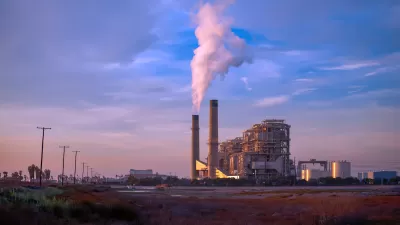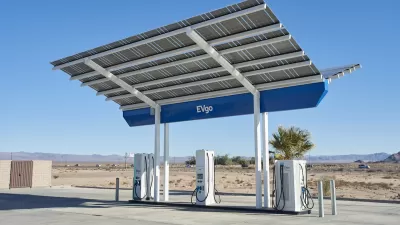On July 22, the congressional attempt to pass comprehensive climate change legislation officially ended for the year. That day the World Resources Institute unveiled a report assessing carbon reductions possible under existing federal and state law.
NYT 'green' blogger John Broder evaluates the WRI report in light of the Senate's failure to pass legislation. It's clear that the EPA's existing authority to regulate carbon emissions under the Clean Air Act would have to play a central role in any reduction effort, says Broder. However, the report concedes that "new legislation is needed to put a price on the emissions from dirty-burning fossil fuels, the group concluded."
"The study (warning: quite wonky) looks at federal and state laws governing greenhouse gas pollutants and asks if they can achieve the goal set by President Obama at the international climate conference in Copenhagen last December - a 17 percent reduction over 2005 levels by 2020.
The short answer from the institute is no. The longer answer is that it depends on how hard federal and state officials try."
From Washington Post editorial: Outlook chilly for a smart climate bill: A range of possibilities remain for possible Senate legislation, e.g. a renewable portfolio mandate, promotion of natural gas and efficiency. "But these are not enough to achieve the size of emissions reductions for which America must aim. The most attractive policy is putting a simple price on carbon, which would encourage private initiative to reduce emissions."
Thanks to California League of Conservation Voters
FULL STORY: After the Climate Bill Failure

Planetizen Federal Action Tracker
A weekly monitor of how Trump’s orders and actions are impacting planners and planning in America.

Chicago’s Ghost Rails
Just beneath the surface of the modern city lie the remnants of its expansive early 20th-century streetcar system.

San Antonio and Austin are Fusing Into one Massive Megaregion
The region spanning the two central Texas cities is growing fast, posing challenges for local infrastructure and water supplies.

Since Zion's Shuttles Went Electric “The Smog is Gone”
Visitors to Zion National Park can enjoy the canyon via the nation’s first fully electric park shuttle system.

Trump Distributing DOT Safety Funds at 1/10 Rate of Biden
Funds for Safe Streets and other transportation safety and equity programs are being held up by administrative reviews and conflicts with the Trump administration’s priorities.

German Cities Subsidize Taxis for Women Amid Wave of Violence
Free or low-cost taxi rides can help women navigate cities more safely, but critics say the programs don't address the root causes of violence against women.
Urban Design for Planners 1: Software Tools
This six-course series explores essential urban design concepts using open source software and equips planners with the tools they need to participate fully in the urban design process.
Planning for Universal Design
Learn the tools for implementing Universal Design in planning regulations.
planning NEXT
Appalachian Highlands Housing Partners
Mpact (founded as Rail~Volution)
City of Camden Redevelopment Agency
City of Astoria
City of Portland
City of Laramie




























